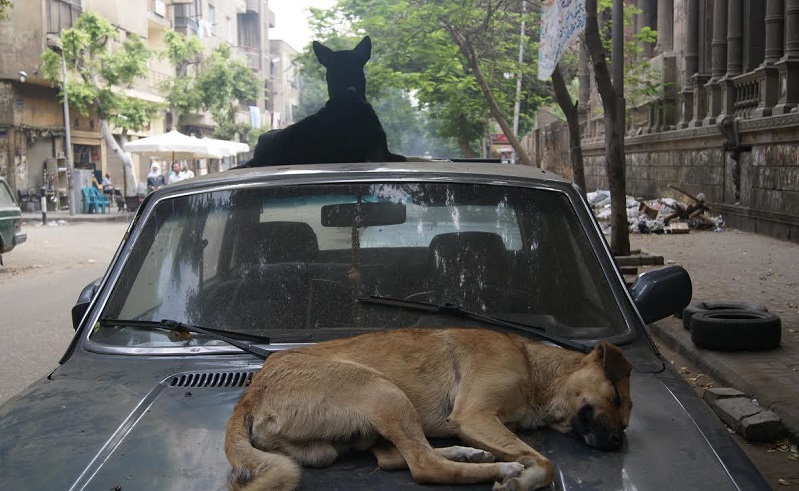Egypt’s stray animal crisis has remained a longstanding issue, with the Egyptian Federation for Animal Welfare estimating that around 100 million stray and street cats roam the country, alongside an estimated 15 million stray dogs.
The absence of comprehensive animal welfare legislation in Egypt remains a significant cause of the ongoing stray animal crisis.
Compounding this issue is the country’s waste management challenges, where inadequate garbage disposal systems and open piles of waste provide stray animals with easy access to food, sustaining and increasing their numbers.
Additionally, the absence of widespread national spay and neuter programs allows stray populations to grow unchecked, as there are no coordinated efforts to humanely control their reproduction.
While local initiatives have made efforts to address the issue, such as the Trap-Neuter-Return (TNR) program in Maadi, which has sterilized over 5,000 cats and 1,000 dogs since its launch in 2014, these efforts are insufficient to curb the growing stray population nationwide
These interconnected factors have contributed to the persistence and escalation of the stray animal crisis in Egypt.
While Egypt’s Constitution states that the state is obligated to ensure the humane treatment of animals, this has yet to translate into robust legal protections. Existing laws, such as the Agriculture Law of 1966, primarily focus on agricultural animals and provide only basic measures against abuse.
Recent efforts, like the May 2023 Law No. 29 on Regulating the Possession of Dangerous Animals and Dogs, aim to address public safety concerns, but they do not explicitly guarantee the welfare of all animals.
Similarly, the Penal Code includes criminal penalties for harming specific animals, but lacks broader provisions to prevent suffering or address systemic neglect.
This legal gap leaves stray animals vulnerable to inhumane treatment and unregulated control measures, as highlighted by recent incidents across the country.
Incidents of Abuse
In October 2024, unethical practices in veterinary training were brought to light when students from Cairo University’s Faculty of Veterinary Medicine reported incidents of animals being subjected to multiple surgeries without proper care or anesthesia.
These accounts have raised serious concerns about the treatment of animals in educational settings and prompted calls for reform in veterinary practices.
In May 2024, a distressing incident in 6 October City brought further attention to the mistreatment of stray animals. Security services in Giza uncovered the circumstances surrounding 11 stray dogs found tied and muzzled outside a prominent hotel in the area. Upon investigation, the driver admitted to collaborating with a hunter, who had been hired to capture stray dogs.
The hunter admitted to being a professional wildlife catcher, revealing how stray animals are often captured using unethical methods. This incident underscored the reliance on inhumane practices to manage stray populations and the absence of effective regulation to monitor such operations.
More recently, in September 2024, a video circulated on Facebook showing a woman pleading with a man in Nasr City to stop poisoning stray dogs. The man, identified as Sayed El-Gharbawy, reportedly ignored her appeals, leading to the death of several dogs.
The video sparked widespread outrage on social media, with many users demanding immediate action against the perpetrator. In response, Cairo security services arrested El-Gharbawy, charging him with poisoning the animals.
The public reaction to the video underscores the power of grassroots movements and local animal welfare organizations in raising awareness and driving change.
Advocating change
Social media has become a vital tool for activists to spotlight cases of animal cruelty, rally public support, and push for government action.
Among the key players in this movement is the Animal Protection Foundation (APF), a non-profit charity and dog shelter registered in Egypt since 2013.
APF has been at the forefront of rescuing stray dogs, providing medical care, and advocating for their rights. By sharing stories like the Cairo University veterinary practices case, the foundation has effectively mobilized public outrage and spurred calls for reform.
Similarly, the Egyptian Society for Mercy to Animals (ESMA) has been a cornerstone of animal welfare in Egypt. As the country’s largest and oldest animal shelter, ESMA has provided sanctuary for countless stray animals while promoting humane treatment through advocacy and awareness campaigns.
Addressing Egypt’s stray animal crisis requires comprehensive animal welfare regulations to replace the limited protections offered by existing laws.
Until then, the work of grassroots organizations like APF and ESMA remains critical, not only in alleviating the plight of stray animals, but also in advocating for systemic change







Comments (0)